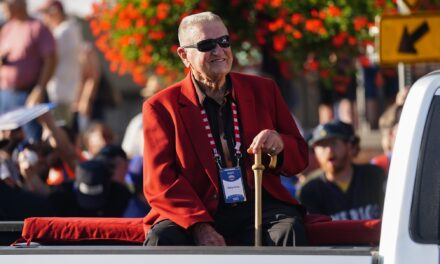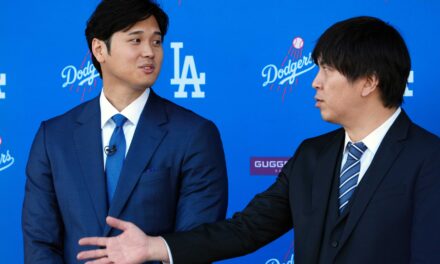The biggest problem I’ve had with Commissioner Bud Selig is he was an owner, but even after divesting himself of the Milwaukee Brewers, he remained an owner at heart.
He’s a former owner paid by the owners, so, where do his loyalties lie?
It will never happen without government intervention, but the best way for baseball to be run is have the commissioner paid equally by the owners and players association, with another percentage from the umpire’s union. That formula should eliminate the perception of partiality.
As commissioner, Bud Selig has the authority to exercise his “best interest in baseball,’’ clause, which permits him to act in the best interest of the sport regardless of whom it impacts.
Selig has that opportunity now that he’s reviewing the Marlins-Blue Jays trade, which all but gutted the Miami franchise. Miami, a team many projected to compete for a wild-card in 2012, had a disappointing season in its first in their new ballpark, traded Jose Reyes, Josh Johnson, Mark Buehrle and John Buck to the Blue Jays for Yunel Escobar and a bushel of prospects.
They are screaming in anger in Miami and for joy in Toronto. Baseball people tell you the best trades are those where both parties feel as if they won. There is no way – outside of salary relief – that Miami owner Jeffrey Loria can believe he won this trade.
After years of politicking – even to the point of threatening to leave South Florida – the Marlins finally got their taxpayer-funded stadium built. Loria promised a competitive, even winning team, and showed those cards with last winter’s free-agent spending spree. He had the money then to commit to those deals, now all of a sudden he doesn’t?
Understandably, the fans in South Florida are angry and venomous towards Loria, and the way they’ll take it out on him is to stay away, thus starting the spiral downwards.
The Marlins will say they can’t compete because of dwindling attendance and shy away from the market. The losing will continue, as will the sparse gates.
Once again, there will be the rumbling baseball can’t survive in South Florida.
A baseball owner is more than an owner of a sports team. His team is woven into the fabric of the community and a bond develops between fan and team. It strengthens over generations and there should be a mutual fierce loyalty.
There should be, those are the operative words.
The Marlins floundered initially, but after spending won the World Series in 1997 and 2003. What the Marlins didn’t learn then, is the crush for tickets comes the year after the winning. Instead of building on their triumphs, the Marlins held firesales and lost considerable good will. Not to mention countless fans, both present and future.
They’ve done so again with this trade. So what if they lost last year. It takes time for a team to come together. If Johnson is healthy, the Marlins could have competed in 2013 sans this trade.
Selig’s responsibility here isn’t to his fellow owners, it is to the ticket-buying and television-viewing public – in that regard Major League Baseball just agreed to a $12.4 billion television contract – in Miami and the rest of the country.
The message he would send in voiding the trade is franchises will honor their commitment to put a representative team on the field and strive to win.
The late Bowie Kuhn made such a statement in the late 1970s when he voided trades of Joe Rudi and Vida Blue to the Yankees and Red Sox. It wasn’t in the best interest of baseball for a championship team like Oakland to disband so drastically because rogue owner Charlie Finley wanted to cut payroll. Maybe Kuhn had it in for Finley, as he reprimanded and overturned the cranky owner’s decision to drop Mike Andrews from the roster after committing a costly error against the Mets in the 1973 World Series.
It took backbone and decisive, immediate thinking and action, and that’s what Selig must do now.
He says he’s reviewing the trade, but I get a bad feeling because he also said he’s talked to two people who said the Marlins received several good, young players. Will he choose those two voices over the thousands of screaming ones in South Florida?
Maybe those prospects will pan out, but if it takes three or four years to develop, where will the Marlins’ franchise be then? Will anybody in South Florida care anymore?
What Loria did is disgraceful. If he can’t afford to compete, or refuse to spend to compete, then he should be compelled to sell the team.
That would be in the best interests of baseball, acting like an impartial commissioner instead of an owner.
















